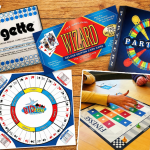Tournament tables don’t reward perfect play on every hand. They reward the smart timing of that play. Whether you’re managing matchpoints in bridge or a chip stack in blackjack, what separates the champion from the rest is the willingness to alter the ‘textbook’ move to meet the scoreboard.
The Winning Mindset: Unseen Parallels Between Bridge and Blackjack Tournaments

The Winning Mindset: Unseen Parallels Between Bridge and Blackjack Tournaments
At first glance, contract bridge and blackjack seem to occupy different worlds. One is a game of partnership, intricate bidding, and trick-taking; the other is a fast-paced battle against the dealer, a race to 21. Yet, when you move from the casual table to the competitive tournament arena, these differences begin to fade, revealing a shared core of psychological and strategic depth. The winning player in both disciplines isn’t just the one who knows the rules, but the one who masters the mental game.
What truly separates a novice from a champion? It often comes down to a specific tournament mindset. Let’s explore the surprising common ground where bridge masters and blackjack sharks find their edge.
Beyond the Cards: The Psychology of Resource Management
Every competitive player understands that the game isn’t just about the cards in your hand; it’s about the resources you have to play with. This principle is the bedrock of both bridge and blackjack tournament strategy.
In a duplicate bridge tournament, your primary resource isn’t your hand but your score relative to the field. You’re constantly managing matchpoints or International Match Points (IMPs). A risky overtrick that might earn you a top board in matchpoints could be a disastrous swing in an IMPs game. The best players don’t just play their cards; they play the scoring system. They know when to push for an extra trick and when to settle for a safe contract to protect their standing.
This is a mirror image of a blackjack tournament. Here, your resource is your chip stack. You aren’t just trying to beat the dealer on every hand. Your goal is to have more chips than your opponents by the end of a round. This completely changes the game. A hand you would normally hit on might become a stand if the table leader has a weak upcard and could bust. Conversely, you might double down on a weak hand late in a round, not because it’s the “correct” play by basic strategy, but because it’s your only mathematical chance to take the chip lead. In both games, your resources, points, or chips dictate your strategy far more than any single hand.
Reading the Table: Adapting to Your Opponents
But managing your own resources is only half the battle. The true masters of the tournament table are also experts at reading everyone else.
Bridge is fundamentally a game of communication and inference. You analyze your opponents’ bidding to deduce their hand strength and distribution, and you watch their plays to track key cards. A moment’s hesitation or an unusual lead can tell a story. You are constantly adjusting your own strategy based on the information, and misinformation, being passed around the table.
While it seems like a solitary game against the dealer, high-level tournament blackjack requires the same level of opponent awareness. You must constantly monitor your opponents’ chip stacks. Is the player to your right short-stacked and likely to make an all-in desperation bet? Is the chip leader playing conservatively to protect their lead? This information is critical. Your betting decisions in the final few hands of a round are made almost entirely based on your opponents’ positions. Ignoring them is like playing bridge without paying attention to the bidding.
The Art of Calculated Risk
Both games demand a departure from “by-the-book” play when the situation calls for it. This is where the art of calculated risk comes in, a skill that separates the good from the great.
In bridge, this might manifest as a gutsy preemptive bid to disrupt the opponents’ communication or a deceptive play to trick a defender into making a mistake. These aren’t random gambles; they are calculated risks based on a deep understanding of probabilities and player psychology.
Similarly, tournament blackjack forces players to deviate from standard basic strategy. The concept of risk becomes fluid. For instance, standing on 16 against a dealer’s 7 is usually a losing play. But if standing guarantees you advance to the next round while hitting carries a risk of elimination, it becomes the correct tournament play. Players who understand these situational dynamics see a significant performance boost, with some analyses suggesting that up to 20% of a player’s edge in the final rounds comes from tournament-specific strategy rather than basic card play. Mastering the nuances of online blackjack tournaments is, therefore, not just an advantage; it’s a necessity.
Endurance and Emotional Control
Finally, let’s talk about the unsung hero of tournament play: mental endurance. A multi-session bridge tournament or a long-form blackjack event is a marathon of the mind.
Fatigue leads to unforced errors. A moment of frustration after a bad beat, a “cooler” in blackjack, or a poor result on a laydown contract in bridge can lead to “tilt,” where emotion overtakes logic. The best players have an almost unnerving ability to stay level-headed. They accept bad luck as part of the game and immediately refocus on the next hand, the next decision. This emotional regulation is a skill honed over countless hours of play. As noted by sports psychologists, maintaining emotional control is a key differentiator in any high-stakes competitive environment. They understand that a single poor decision driven by frustration can undo hours of solid play.
Whether you’re calculating declarer play or managing a chip stack, the ability to maintain focus, control your emotions, and make disciplined decisions under pressure is the ultimate common denominator. It’s the engine of the tournament mindset.
Frequently Asked Questions
Is tournament strategy really that different from casual play?
Yes, dramatically. In casual play, the goal is often to maximize winnings on each individual hand or session. In a tournament, your goal is to survive and advance by outperforming your opponents.
What is the biggest mental mistake players in both games make?
One of the most common and costly mistakes is “resulting,” judging the quality of a decision based on its outcome. A player might make a brilliant, high-probability play that fails due to bad luck and then doubt their strategy.
Can skills from competitive bridge help me in a blackjack tournament?
Absolutely. The core skills of situational awareness, risk assessment, and opponent observation are directly transferable. There are many brilliant bridge players who also play blackjack, some even publishing books on the topic.
How important is it to watch other players in tournament blackjack?
It is critical, especially as a round nears its conclusion. In the last few hands, your decision to bet, hit, stand, or double down is often less about your own cards. Ignoring the other players is a surefire way to get eliminated.








